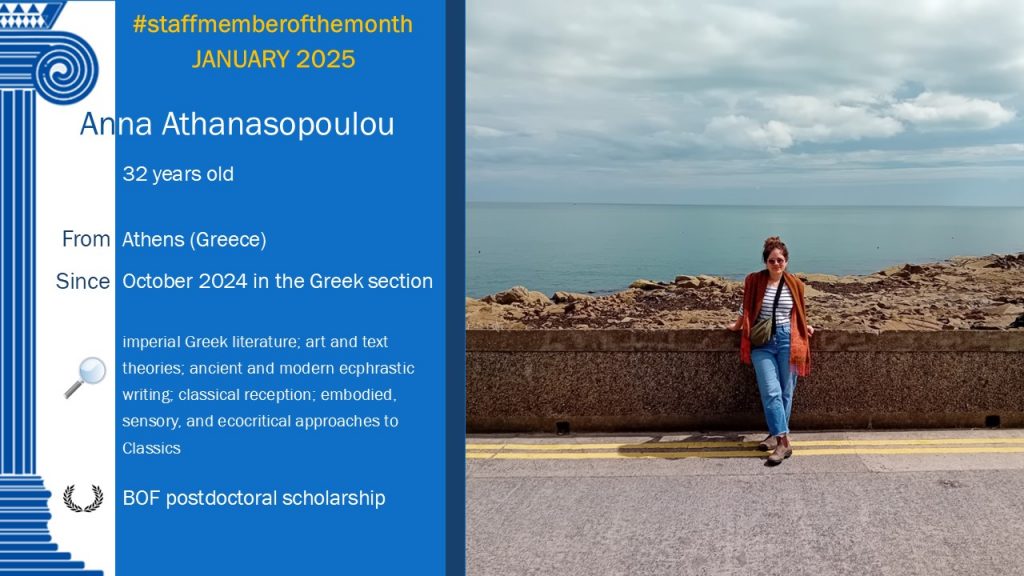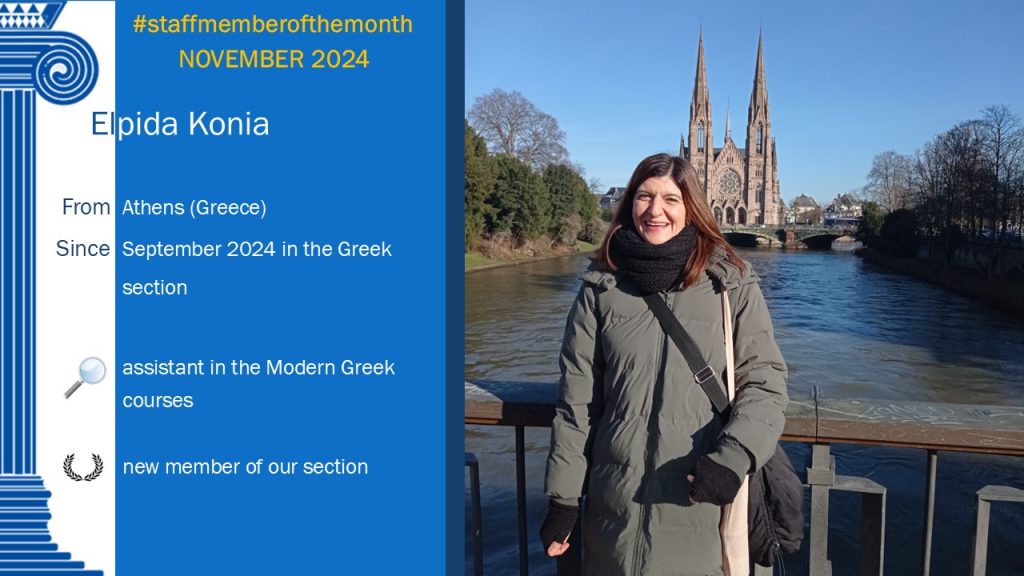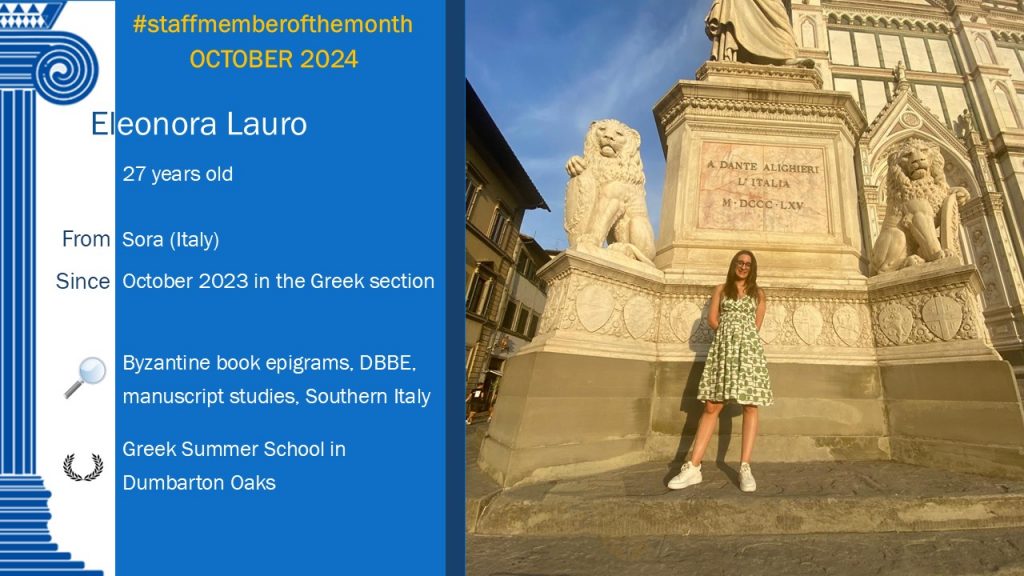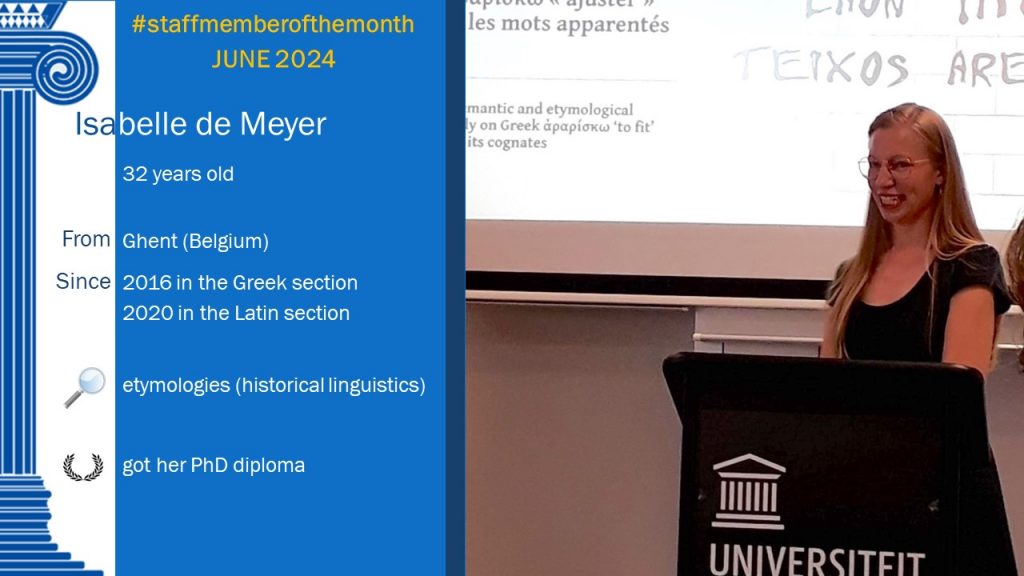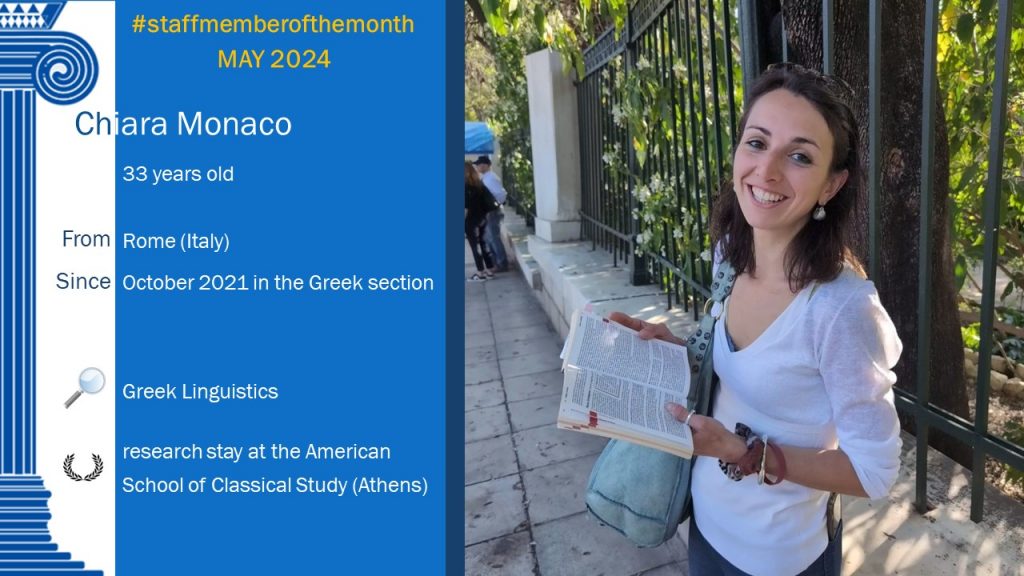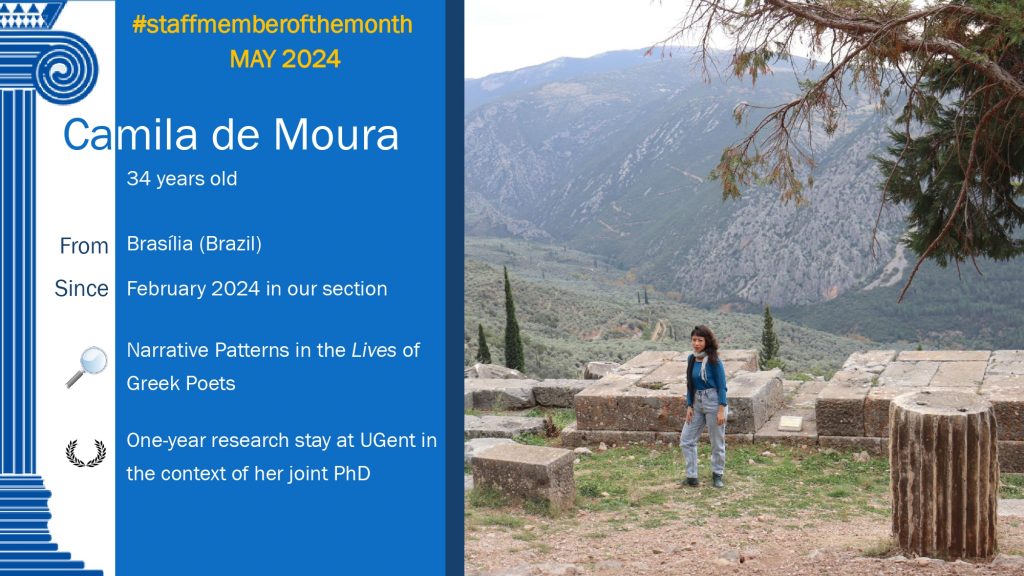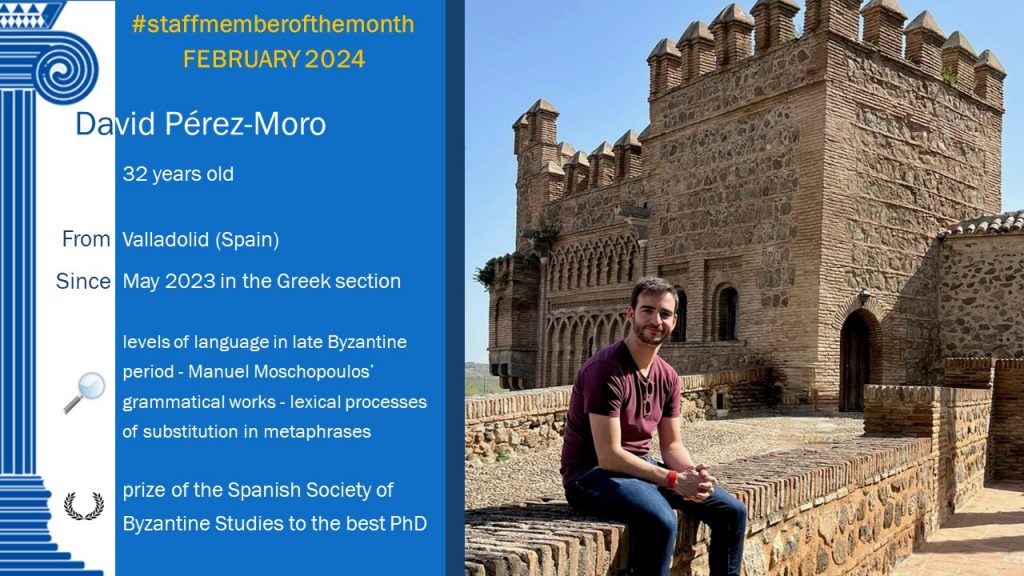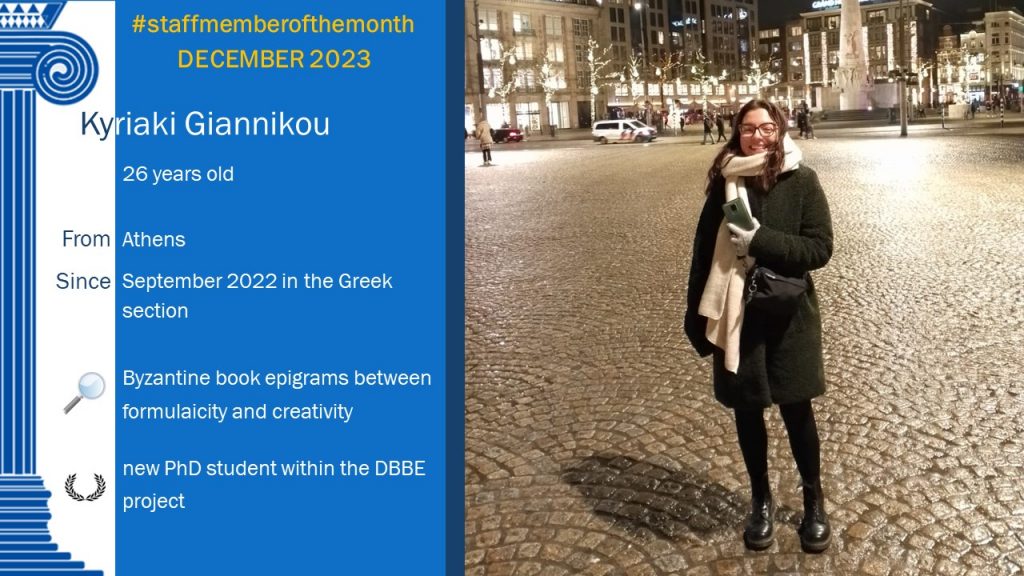Marthe Nemegeer is our Staff Member of the Month! She recently began a position as PhD researcher under the supervision of Professor Andrea Cuomo. Her work focuses on the palaeographical, linguistic, and theological dimensions of Byzantine texts and translations. Olivier Demerre spoke with her about her research, her academic journey in Ghent and London, her commitment to teaching Greek to high school students, and the role of sports in maintaining a healthy work-life balance. Succes, Marthe!
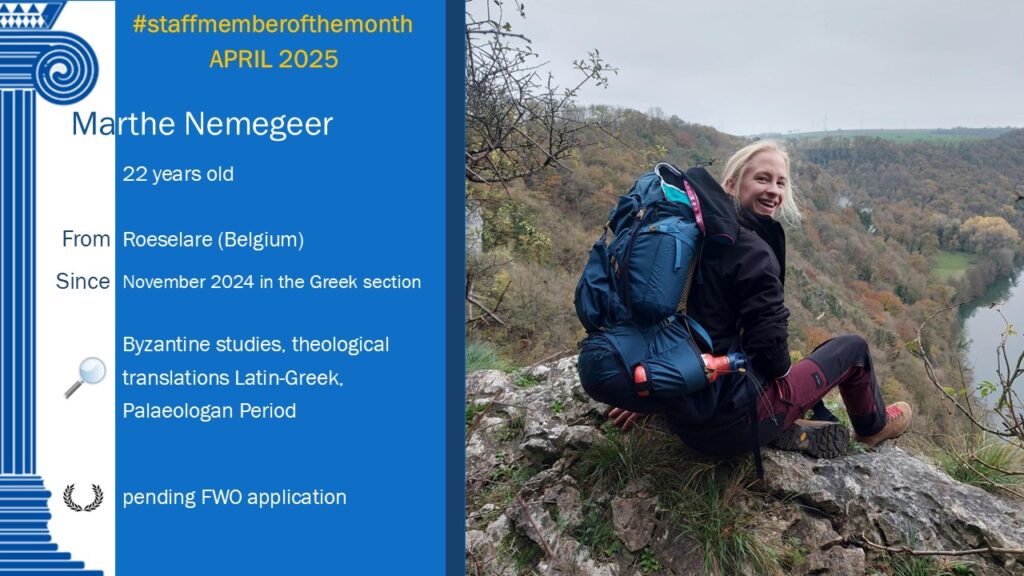
Hey Marthe! Could you tell us a bit more about your current position at Ghent University and what you’re working on for your research?
Hi Olivier, of course! I am currently funded by Ghent University as a PhD researcher under the supervision of Prof. Andrea Cuomo, while awaiting the outcome of my FWO application. My research proposal focuses on Manuel Kalekas’ Greek translation of St. Anselm’s Cur Deus homo, which I wish to study from a palaeographic, linguistic, and theological perspective. If my application is approved, I will prepare an edition of Kalekas’ autograph and then analyse the Greek text in comparison with the Latin using NLP tools. In addition to the linguistic analysis, I also aim to explore the broader context and impact of this translation on Byzantine thought. In the meantime, I am revising parts of my supervisor’s research on the scholia to Sophocles’ Electra and preparing an edition of Demetrios Kydones’ Homily on the Ascension of the Lord. So I have a few parallel projects going on, which keeps things varied and gives me the opportunity to explore different aspects of Byzantine studies.
You studied Greek in Ghent and completed part of your studies at the Royal Holloway in London; how was that experience, both academically and personally?
Indeed, I obtained a second MA in Late Antique and Byzantine Studies. Academically, I would say it was a very interesting and enriching experience to study in London and learn how their organisation differs from our Belgian institutions. London Universities (my program was taught jointly by Royal Holloway, King’s College, and University College) are actually very informal and administer much less exams than here in Ghent. Almost every course is assessed through short papers (often only 3000 words). Professors are addressed by their first names and students come to school in sweatpants – very odd… They also do not offer the same courses each year, which severely limits one’s options, but I immensely enjoyed my courses on papyrology with Nikolaos Gonis and Sanskrit with Italia Maddalena, even though they were both chosen as ‘second options’. Last but not least, London was the perfect base for visiting the universities of Oxford, Canterbury, and Cambridge.
To be honest, the personal experience was a bit disappointing. Because there was no set curriculum, I barely saw my fellow ‘LABS’ students who took different classes than me, so that it was hard to form close friendships. This is made even more difficult by the fact that London is so big and everyone comes from different places – sometimes hours away from the city – so meeting up for a quick coffee wasn’t easy. But I shouldn’t complain. I lived there with my cousin, who had just started a postdoc in biomedicine, and we explored the city together 😊
You’ve also taught one of the workshops for high school pupils which the section offers, what were they about, and what did you enjoy most about teaching them?
Yes, Anne and I taught two workshops together, giving high school pupils a ‘playful introduction to Ancient Greek’. As the name says, we introduced them to the basics – the what, when, and where of Ancient Greek. I really enjoyed seeing their growing enthusiasm throughout the class. At first, they have no idea what we are talking about, but as the session goes on, they begin to understand understanding, learn the alphabet, write their own names, and are challenged to find connections between their own language and Ancient Greek. In the first class, most pupils had Dutch as their mother tongue, but the second class was made up entirely of girls who spoke Arabic. This was particularly interesting and challenging for Anne and me.
We’ve heard you’re a big fan of sports, and that you might even be aiming for a spot (at least in the audience!) at the next Olympic Games… How does your passion for sports inspire or support your academic journey?
Haha, yes… we will see about the Olympics, but I do enjoy a lot of sports. I think it’s a great way to clear my head and take a step back from work when I cannot see the forest through the trees anymore. As we all know: mens sana in corpore sano. I also see many parallels between sports and academics: the discipline, the perfectionism, even the competition… In both fields, it’s about pushing limits, staying focused and constantly striving for improvement, though I hope that by doing both, I prevent myself from becoming too extreme in either. This thought reminds me of another Ancient wisdom: Μηδὲν ἄγαν 😉

